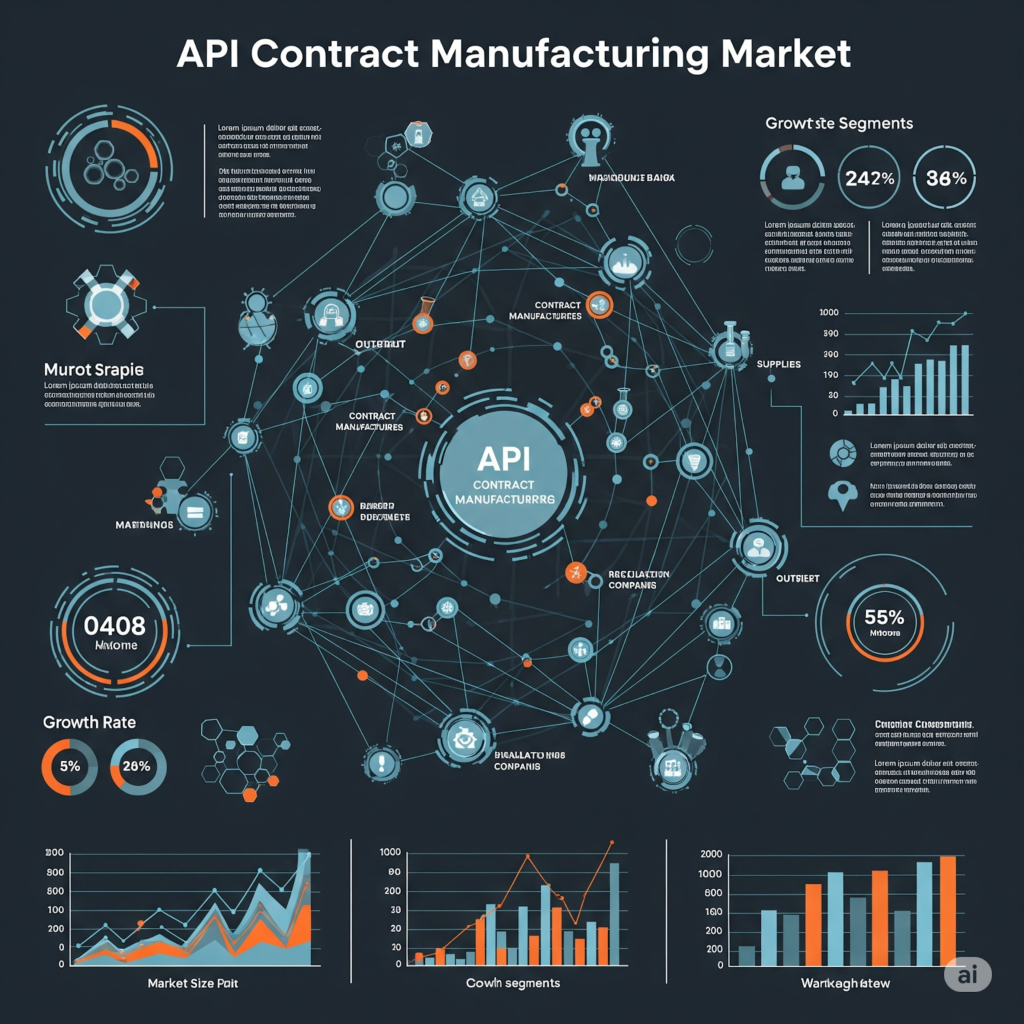
With rising complexity in drug development, cost pressures, and the global push toward scalable and flexible pharmaceutical production, the API Contract Manufacturing Market is witnessing steady expansion. Pharmaceutical companies—especially generics and biotech firms—are increasingly outsourcing Active Pharmaceutical Ingredient (API) production to focus on R&D, reduce capital investments, and ensure regulatory compliance.
As detailed in the latest market report by Prophecy Market Insights, the market is segmented by type, volume, form, end-users, distribution channels, and region, offering valuable forecasts through 2030.
Market Drivers: Why Outsourcing is Booming
Outsourcing API manufacturing is becoming a strategic imperative due to:
- High cost of infrastructure and compliance for in-house production
- Demand for faster drug development cycles
- Complex chemistries in novel therapeutics and biologics
- Increasing FDA and EMA pressure on cGMP adherence
Small to mid-size pharmaceutical and biotech firms, in particular, rely heavily on Contract Manufacturing Organizations (CMOs) to scale up production, meet quality benchmarks, and accelerate time-to-market.
Market Segmentation Overview
By Type:
- Organic
- Inorganic
- Others
Organic APIs dominate the landscape due to their widespread use in both branded and generic drugs. Inorganic APIs, such as mineral-based formulations and radiopharmaceuticals, occupy a niche but are growing in specialized therapies.
By Volume:
- Low
- Medium
- Large
- Others
Large-volume APIs, primarily for chronic therapies like cardiovascular and diabetes drugs, represent the largest segment. However, low-volume APIs are gaining traction in orphan drugs and targeted oncology treatments, where small batches with high precision are required.
By Form:
- Solid
- Liquid
- Semi-Solids
- Others
Solid-form APIs, such as powders and granules, remain dominant due to their stability and easy formulation into tablets or capsules. Liquid and semi-solid APIs are increasingly used in topical and injectable forms, offering flexibility in modern therapeutics.
📩 For full data breakdown and custom analysis by formulation, request sample here.
By End-User:
- Pharmaceutical Industries
- Research Organizations
- Others
Pharmaceutical companies remain the primary clients, contracting APIs for generics, branded drugs, and new chemical entities. However, research organizations and biotech startups are rapidly expanding their outsourcing needs, particularly in early-phase clinical trials and novel drug discovery.
By Distribution Channel:
- Direct Tender
- Retailers
- Others
Direct tendering remains the dominant distribution method, particularly for large contracts. However, retail pharmacy-linked channels are growing, especially in emerging markets where local manufacturers act as contract suppliers.
Regional Outlook
- North America holds the largest market share, driven by advanced pharmaceutical R&D, presence of global API contractors, and strict regulatory standards.
- Europe follows closely, particularly in countries like Germany, Switzerland, and Italy with strong contract manufacturing ecosystems.
- Asia Pacific, led by India and China, is the fastest-growing region due to cost-efficient manufacturing, government incentives, and global export dominance.
Many multinational pharma companies are shifting manufacturing contracts to Asia to reduce costs while meeting regulatory compliance through well-established CMOs.
Need localized insights by region? Request customized report based on your target geography.
Key Market Players and Strategic Moves
The API Contract Manufacturing space is moderately consolidated, with top players adopting strategies such as capacity expansion, acquisition of smaller CMOs, and vertical integration to stay competitive.
Key players include:
- Eva Pharmaceuticals Industries Ltd.
- Sun Pharmaceutical Industries Ltd.
- Boehringer Ingelheim GmbH
- Piramal Pharma Solutions
- Sandoz AG
- GlaxoSmithKline Plc.
- Lupin
- Juniper Pharmaceutical
These companies are enhancing their API production capabilities across small molecules, biologics, and high-potency APIs (HPAPIs), particularly in oncology and rare diseases.
Strategic partnerships and regulatory certifications (US FDA, EMA, WHO GMP) are critical for expanding global presence and earning long-term contracts.
Emerging Trends and Market Outlook
The next generation of API contract manufacturing will be shaped by:
- High-potency APIs (HPAPI) for oncology and hormonal drugs
- Continuous manufacturing technologies
- Green chemistry and sustainability protocols
- Digital integration of supply chains for real-time tracking and compliance
- Customized, small-batch API production for personalized medicine
Riya More comments, “As the pharmaceutical industry continues to evolve rapidly, contract manufacturers must offer technical expertise, scalability, and regulatory precision. The API outsourcing market is no longer just about cost—it’s about agility, speed, and trust.”
Conclusion
The API Contract Manufacturing Market stands at the forefront of pharmaceutical globalization. With increasing pressures to reduce costs, meet faster launch timelines, and manage regulatory risks, outsourcing API production is more vital than ever. Companies that can offer compliant, cost-effective, and scalable solutions will lead the charge in a multi-billion-dollar industry through 2030.
The macro analyst desk brings highly sought after financial news based on market analysis, insider news and company filings.
